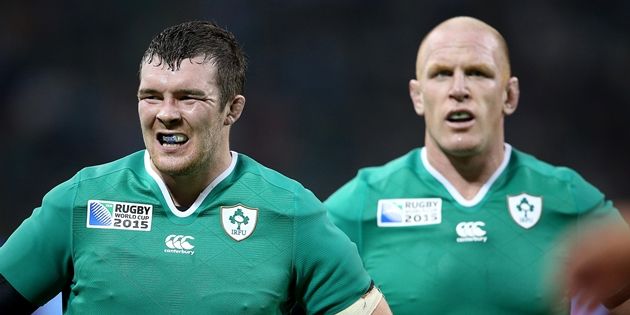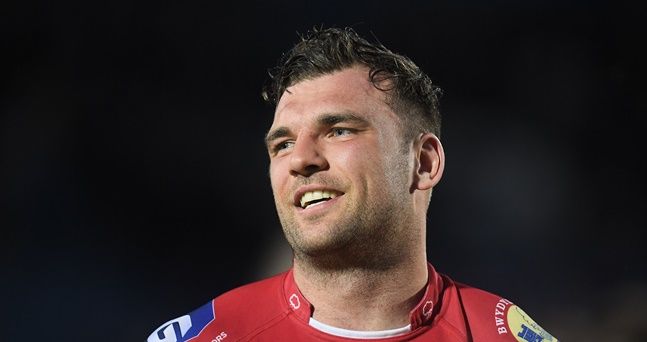It’s amazing what one loss can do.
Everyone likes the idea of experimentation until you’re standing there with soot on your lab coat and smoke in your face, but just because an experiment failed at the first hurdle, it doesn’t necessarily mean that the whole process was a waste of time.
The success of the Irish Rugby team over the last five years has been so consistently great that there’s now a growing expectation for the national team to win any game they play.
This is a country where people were walking around boasting about Triple Crowns over a decade ago and where they tried to bury defeats to the likes of Italy only a decade before that.
Now there’s an expectation to compete for Six Nations titles, Grand Slams and World Cups. Increased success has undoubtedly led to increased expectations.
But when you looked at Joe Schmidt in his post-match press interview on Saturday he didn’t seem like a coach who was thrilled to take positives from defeat.
He’s not exactly an ‘every cloud has a silver lining’ type of guy. There’s winners and losers in Test rugby. You’re either one or the other.
Ireland were second best on Saturday but they weren’t too far off the Wallabies.
Schmidt handed rare starts to Rob Herring, John Ryan, Jordi Murphy and Joey Carbery in Brisbane as Ireland fell to an 18-9 defeat in the first of three Tests against Australia, a loss which ended a 12-match winning streak in the process.
Schmidt noted after the match that the margins between both sides were small but what does the New Zealander do from here with the series on the line; revert to a full-strength side or continue to experiment with different players?
There’s arguments to both sides. The argument for reverting to a full-strength side is that the benefits gained from a series win in the southern hemisphere would give Ireland great momentum heading into the 2019 Rugby World Cup in Japan next year.
It’s an argument that is supported by former Ireland flanker Kevin McLaughlin.
“The experimenting is finished,” McLaughlin declared on the latest episode of The Hard Yards. “Joe wants to win this series.
“Part of this Irish team’s evolution is they have to be able to go down to Australia, South Africa and win a Test Series.
“You look at England, when they won a World Cup, they went down to New Zealand and beat New Zealand. I think they beat Australia as well. That was part of their evolution and, the following year, they won the World Cup. That is the way Joe (Schmidt) is going to be thinking now… this is a massive Test.
“They lost the first game so he’s going to bring back… he’s going to go all out for the next game. A championship decider, really, because if they lose, they’ve lost the Test Series. I think you’ll see Ireland coming out all guns blazing and fully stacked this weekend.”
England did beat New Zealand and Australia before they went onto win the 2003 Rugby World Cup in Australia, but by contrast, and in more recent times, the only two Rugby Championships that New Zealand have lost this decade were in 2011 and 2015; the same years they won the Rugby World Cup.
Losing a major tournament a month before the World Cup didn’t seem to have a significant impact on the All Blacks in World Cup years goneby so should losing a Test series 15 months before a Rugby World Cup really be of great concern for Ireland, especially if Schmidt is giving less experienced players a run along the way?
The 2015 Rugby World Cup quarter-final loss to Argentina was humiliating for Schmidt and an undoubted low point in what has been a stellar tenure for him as Ireland coach.
The loss of Johnny Sexton, Paul O’Connell, Sean O’Brien and Peter O’Mahony before that match exposed Ireland’s lack of depth in that tournament and it’s an issue which has since been addressed in the national side.
Ireland have better players now than they did at that tournament but it’s still vital that Schmidt gives those on the peripheries of his squad time to develop and those that are vital to his plans time to rest.
“I’d like to see some fresh 9 and 10s,” former Munster centre James Downey told The Hard Yards before the start of the tour.
“We rely heavily on Sexton and Murray. I know I’ve beat the drum heavily on this but I’d like to see Marmion play a good bit more and for Carbery to play a bit more 10. He’s not playing enough there for Leinster, purely from an Irish perspective.
“The rest of the young lads are getting enough game-time across the backline but not nine and 10.”
The experimentation doesn’t need to be drastic either. It’s not like there’s a situation brewing here where Schmidt is handing guys like Darren Sweetnam or Adam Byrne token caps in the November series before discarding them to the international wilderness thereafter.
Schmidt can bring in some genuinely quality players, not to disrespect the aforementioned, but if he was to bring in the likes of Andrew Conway and Tadhg Beirne for the next test they could be changes worth making.
Beirne has been one of the best players in Europe this season and it would be great to see him get a run in the second-row alongside James Ryan, and while Rob Kearney has had a great season for club and country, he hasn’t scored a try for Ireland in his last 18 games.
By comparison, his opposite number in this series, Israel Folau, has scored 12 tries for Australia in the same amount of games. What harm is there in seeing what Andrew Conway can do at the back?
I like high ball security, experience and a big left foot as much as the next person, but if zero tries in nearly 20 games is the staple, why not see what someone with some genuine speed and finishing ability can do back there?
The changes for Ireland don’t have to be dramatic. You don’t have to throw Ross Byrne in at fly-half or Niall Scannell in at hooker to experiment.
If Schmidt brought in proven quality in Beirne and Conway into the starting team, started Jordan Larmour on the wing in place of the injured Keith Earls and brought John Cooney onto the bench, while still bringing back front-line starters like Cian Healy, Tadhg Furlong, Johnny Sexton and Dan Leavy, that may be enough of a mix for the second Test.
Schmidt noted that the margins between Ireland and the Wallabies are fine but the depth is so strong in Irish Rugby right now that the national team can field a very competitive side while still giving those on the peripheries of the first team a run.
There’s also the fact that this could be the last chance to experiment against meaningful opposition.
Ireland play Italy, Argentina, USA and New Zealand in the November series later this year.
No great stock can ever be taken from a November win over Argentina, Italy and the USA are simply not up to the required standard where fringe players can really learn what it takes to win at the highest level of international rugby, while Ireland are simply not experimenting against the All Blacks or in the Six Nations.
That leaves Schmidt with around three to four warm-up matches before Ireland are off to Yokohama for their World Cup opener against Scotland.
Schmidt doesn’t need to reinvent the wheel here but he doesn’t necessarily need to take the lab goggles off either.
Ireland can still field a team that can win and play some players that could really stand to learn if they featured in the second Test in Melbourne.
What would you rather have a Lansdowne Cup or players that have been tested when it really matters?
There’s potentially scope for both in Victoria this weekend.
My Ireland team for the second Test:
Backs: Conor Murray, Johnny Sexton; Jacob Stockdale, Robbie Henshaw, Garry Ringrose, Jordan Larmour; Andrew Conway.
Forwards: Cian Healy, Sean Cronin, Tadhg Furlong, Tadhg Beirne, James Ryan, Peter O’Mahony, Dan Leavy, CJ Stander
Substitutes: Rob Herring, Jack McGrath, Andrew Porter, Devin Toner, Jack Conan, John Cooney, Joey Carbery, Rob Kearney.





































